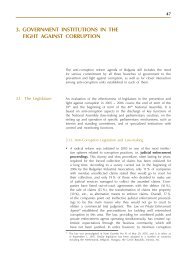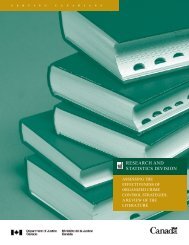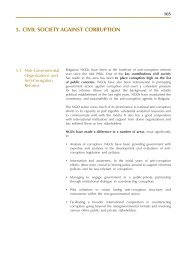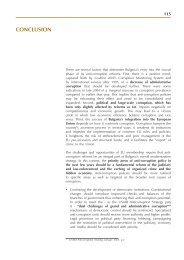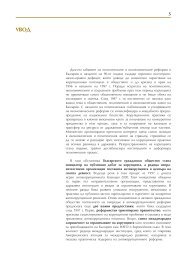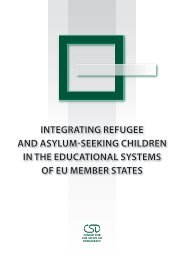National Threat Assessment 2008. Organised Crime - Politie
National Threat Assessment 2008. Organised Crime - Politie
National Threat Assessment 2008. Organised Crime - Politie
You also want an ePaper? Increase the reach of your titles
YUMPU automatically turns print PDFs into web optimized ePapers that Google loves.
Of all the regional airports, Rotterdam Airport has the highest number of<br />
recorded weapons and explosives. Inspections for weapons and explosives<br />
are not performed at small airports. Nevertheless, a number of incidents did<br />
come to light.<br />
Small and regional airports<br />
Hardly any inspections are performed at small airports to check for weapons<br />
and explosives. The authorities that are authorised to perform inspections do<br />
not do so systematically. The police registration systems show that crime does<br />
occur at small airports, but the scale of it remains unknown. It is often<br />
discovered by chance. This applies especially to serious and organised crime,<br />
where criminal investigations require specific expertise, and this expertise<br />
is currently not available.<br />
Small airports may pose an additional risk due to their location close to the<br />
North Sea (for example, Texel and Ameland), as a result of which goods could be<br />
delivered and shipped quickly without being noticed. Small airports facilitate<br />
landings from outside of the Schengen area without knowing it, even though<br />
they are not designated points of entry. The aircraft in question indicate that<br />
they have already landed elsewhere in the Schengen area, thereby suggesting<br />
that they have already been cleared. This is not always the case. In Germany, for<br />
example, small aircraft are sometimes allowed to land to refuel without being<br />
cleared, after which they continue on to the Netherlands. In the Netherlands it is<br />
then unclear from where the aircraft originally came. As soon as an aircraft has<br />
landed in Europe or if it comes from a European country it has freedom of access<br />
within the European Union. According to many, the removal of the inspections<br />
between Schengen countries has created extra risks.<br />
Experts agree that small airports provide enough opportunities for cross-border<br />
crime. The fact that this crime is not discovered often enough is related to a lack<br />
of inspections and expertise.<br />
Regional airports do not have enough properly equipped staff either and<br />
resources such as sniffer dogs or scanning equipment are often not available to<br />
check for smuggling. At a few regional airports the number of incidents is rising,<br />
possibly due to the increased number of flights via those airports. This may also<br />
be the result of a displacement effect from Schiphol to the smaller airports.<br />
Business flights are also considered to be high-risk. These flights are often<br />
uncontrolled; inspections upon arrival and before departure are insufficient or<br />
are not performed at all.<br />
Just like small airports, regional airports seem to be locked in a vicious circle.<br />
Without targeted inspections and specific expertise offences are not detected.<br />
Without registration of offences not much appears to be happening and<br />
chapter 6 – alerts<br />
231



